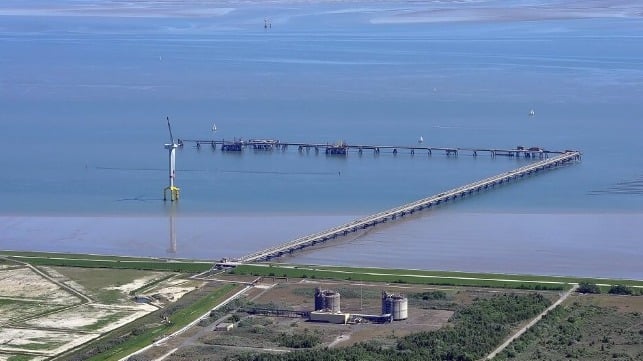Germany Completes First FSRU Terminal at Lightning Speed

Germany is scrambling to arrange more LNG import capacity as it works to replace Russian pipeline gas, and floating storage and regasification units (FSRUs) are the fastest method available. These ship-mounted import terminals can be deployed anywhere with a pier and the appropriate shoreside utility infrastructure, and Germany is showing just how fast it can be done. The first of five new German FSRU landing sites began construction on May 5 and was completed on Tuesday.
The utility company Uniper has constructed Germany's first FSRU site at the Umschlagsanlage Voslapper Groden (UVG) transshipment complex in Wilhelmshaven. Germany's federal government provided support for the project, in line with its focus on securing gas supplies. The main goal is to keep the German economy well-heated through the winter, but at some point down the road, Uniper hopes to use an expanded terminal to import "green gases."
The project was finished in just 194 days, a lightning pace for Germany. The government accelerated permitting and granted an "early start" authorization in order to get it built quickly.
Since the German government has purchased 98.5 percent of all shares in Uniper in order to stabilize the utility's finances, the terminal is effectively a nationally-owned project. Grid operator Open Grid Europe (OGE) is providing a 15-mile pipeline connection to the site, which will transfer the gas to a storage facility in nearby Etzel.
The terminal will be operational after it gets its chartered FSRU, the Hoegh Esperanza. The vessel should arrive in mid-December, and once hooked up and commissioned, it will be able to regasify up to 7.5 billion cubic meters (bcm) of natural gas per year for the German market. This is enough to replace about 15 percent of the Russian gas that Germany bought in 2021, before the war and the Russian clampdown on exports.
"Every cubic meter we import to Germany via alternative routes in the future will help us free ourselves more quickly from Russia's grip," said Lower Saxony energy minister Olaf Lies in July. "We are currently demonstrating what the new German speed means: we are planning, approving and building at eight times the normal speed."
Germany has chartered a total of five FSRUs to date, each with a capacity of 5.0 bcm per year or more. A privately-operated FSRU with a capacity of 4.5 bcm per year is expected to come online in Lubmin at the end of this year. Between these projects, Germany should have a regas capacity of 30 bcm per year by the end of 2023, up from zero at the start of 2022.

that matters most
Get the latest maritime news delivered to your inbox daily.
"The example of Wilhelmshaven shows: Germany can be fast and advance infrastructure projects with great determination if the federal and state governments and the project participants pull together," said Vice Chancellor Robert Habeck in a statement Tuesday.
Top image: The Umschlagsanlage Voslapper Groden (UVG) transshipment complex before conversion (Ra Boe / CC BY SA 3.0)
